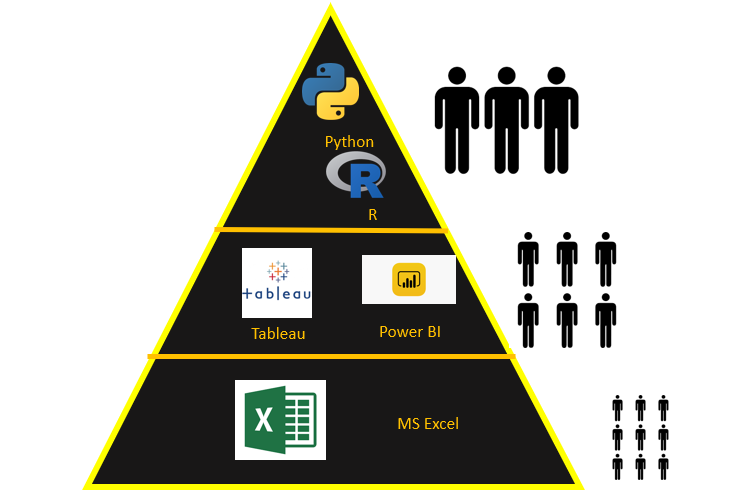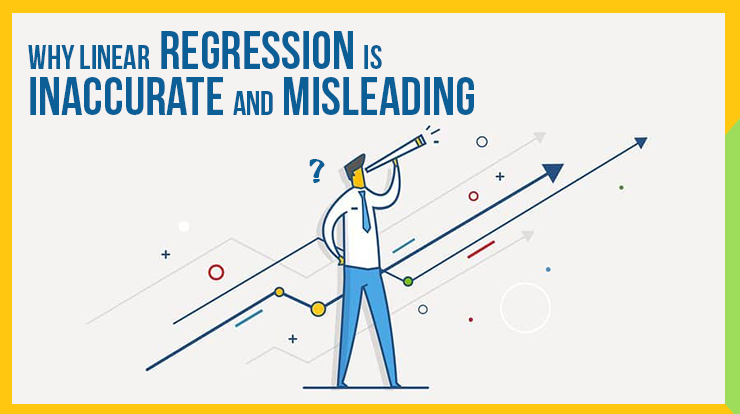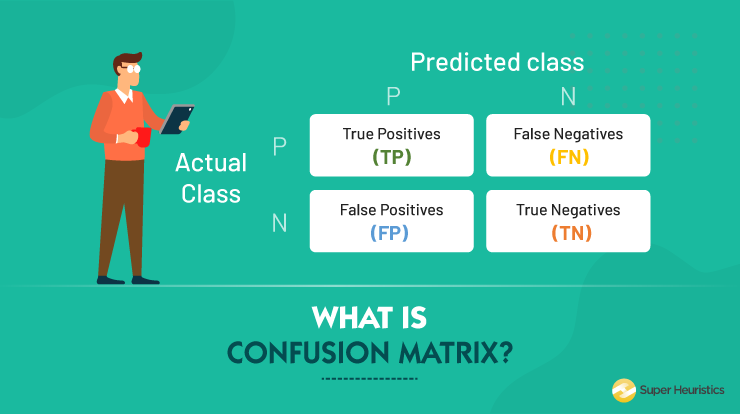
To tell you about why is Marketing Analytics important for MBAs and managers – I could have started off by putting out a statistic about the demand of Marketing Analytics jobs across the world.
For example this one – according to the US Bureau of Labor Statistics, the demand for Marketing Analytics jobs is rapidly increasing and year-over-year growth of 22% is projected between 2020 and 2030.
And that is just for the US. You could extrapolate that trend for India and expect her to witness a similar trend in demand for people with these skills.
But that’s not the point.
The reason is that – that statistic only tells that those who want to go for “Marketing Analytics jobs” need to pay attention to it.
The only research that I would endorse would be research that told this one thing bold and clearly – every Marketing Job is a Marketing Analytics job!
Such research would blow the lid off all the MBA students and managers who thought tech and analytics is not for them. And that would be the best answer to why is marketing analytics important for MBAs and managers.
My mother’s a scientific researcher in Biochemistry and what I have picked from there is that – when there’s no research available – you do your own research.
So, let me take you through detailed research that will tell you about the importance of marketing analytics for MBAs and marketers.
Why is Marketing Analytics important for MBAs and Managers?
Just last year, I decided to conduct this research to understand what are the trouble areas for people in their Marketing career and in their journey of learning marketing.
Here’s what I did. I approached four different kinds of people. These were:
- MBA aspirants
- MBA students
- MBA recent graduates (graduated <1 year ago)
- Others – Entrepreneurs, Marketers, non-MBAs
And to each of these four different segments, I shared a couple of statements. These were the challenges which they could be experiencing in their journey of learning marketing or their marketing career.
The objective for them was to rank these problem statements and choose their top-3 problem statements that is relevant to them in their current situations. These were the problem statements:
- How to solve marketing problems through data analytics?
- Is marketing the right career for me?
- How to create an integrated marketing plan?
- How to build a strong network of professionals?
- How to create an integrated marketing plan?
- How to create a strong profile for placements?
- How to do digital marketing?
- How to increase productivity by managing time?
- How to learn analytics / data science?
- How to find a career and life mentor?
- How to do personal branding at work place?
- How to delegate work?
- How to find a career and life mentor?
- How to stand apart in college through personal branding?
- How to perform well in internships and get a PPO?
- How to do marketing projects at work?
- How to get a marketing role in first/next job?
- How to prove interest in Marketing in MBA admission interviews?
- How to learn marketing concepts?
- How to analyse marketing case studies?
- How to solve marketing assignments?
- How to create a strong marketing profile for internships?
- How to do go-to-market of a business idea?
- How to win competitive case competitions?
- How to win competitive case competitions?
One thing regarding the research – the MBA students were from a good range of B-schools. It includes people from IIM Calcutta, MDI Gurgaon (Tier 1&2 B-schools) and the students of Tier 5, 6 B-schools.
Therefore, the group is fairly diverse and the results are not influenced by any one ideology.
What were the results of this research?
The results of the research didn’t come across as a shock to me. But it could to you, if you have been living under a rock about core technology and its intervention and alignment with marketing.
And that’s why you need to wait until I tell you what the MBA Graduates think.
Let me start off with the MBA Aspirants. For the MBA Aspirants, the top 3-challenges were:
- How to analyze marketing case studies?
- How to win case competitions?
- Is marketing the right career for me?

Understanding the results:
This is in-line with what you would expect from an MBA aspirant. Aspirants do get a sense of the fact that every day at a B-school is going to be case study analysis.
Also, they come to know that the gateway to some of the best placements is through the case competitions organized by some of the best corporates.
That explains why the (1) and (2) are their biggest problem areas.
Further, as an MBA aspirant you are likely to be unsure of what career opportunity would you like to pursue. Most MBA students, in fact, figure out what career they want to pursue in the second-year of MBA.
Therefore, (3) which is “Is Marketing the right career for me?”, is a legitimate challenge to have.
Coming to what the MBA students think. These are those people who were still in their B-school at the time of the research. For the MBA Students, the top 3-challenges were:
- How to analyse marketing case studies?
- How to win case competitions?
- How to create a strong profile for placements?

Understanding the results:
Surely, not a lot is going to change between you being an MBA aspirant and then you joining a B-school. Therefore, (1) and (2) will surely remain to be your concerns.
But as you enter the B-school, the summer placements are right in front of you. Therefore, (3) which is “How to create a strong profile for placements?” becomes a new found challenge for the students.
All of this makes sense to you till now, doesn’t it?
But wait until you see what the MBA Recent Graduates and Others have listed as their challenges.
For the MBA Recent Graduates, the top 3 challenges have been:
- How to solve marketing problems through data analytics?
- How to create an integrated marketing plan?
- How to learn analytics/data science?
And for the Others i.e., Entrepreneurs and Marketers, the top 3 challenges were:
- How to solve marketing problems through data analytics?
- Is marketing the right career for me?
- How to create an integrated marketing plan?

Understanding the results (and here’s where it gets interesting):
Notice that how the priorities completely change when you move out from the cocoon that you B-school is and get into the industry.
Notice that for the recent MBA graduates, the three most important challenges are around Marketing Analytics and Digital Marketing.
Surprisingly, for the non-MBA entrepreneurs and markets, the priorities are exactly the same i.e. Marketing Analytics and Digital Marketing.
So, what does the research tell you?
If you are an MBA aspirant or MBA student, what does the research screams out to you?
It should probably tell you that, please start acquiring Digital Skills. That is because when you get out of the B-school and get into the industry – irrespective of which marketing job role you are in – it requires you to get savvy with these Digital skills.
That is why in almost all of my videos on the YouTube and all my articles you would be seeing that how much I propagate the message of MBAs need to learn Digital Skills.
Marketing Analytics is for every marketing job role!
One common problem or confusion that I see in marketing students across B-schools comes from one big misconception. And that misconception is that:
“I don’t need to learn Marketing Analytics because I am not aiming for analytics jobs”
That is wrong! That is the cry of anyone who is not able to sense the future of work.
Any marketer out there, especially a marketing leader of the future, needs to have an appreciation for technology. There is analytics in every aspect of marketing.
The confusion also is that Marketing Analytics is always about coding and learning Python. It’s not!
And it is for that reason that in one of my videos I mentioned about how there are three different level of marketing analytics.

So, from here you can see that even if you are working on a common tool like Microsoft Excel, you could be involved in some kind of analytical decision making for marketing and that is Marketing Analytics.
Further, more sophisticated tools to analyse data have been business intelligence tools like Tableau and Power BI. That is the next level of tech that you should embrace as it can allow you to do more accurate predictive marketing analytics and data visualization.
And finally, then there comes much more sophisticated analytics using tools like Python and SQL.
Therefore, whatever job role you may be in in the field of marketing – I can guarantee you that there would be some level of marketing analytics that you should be involved in that you may not be doing right now.
This should be a wakeup callWhat makes Marketing Analytics important?
From the perspective of organizations, they need someone who can provide them with fact-based market insights. Research has shown that companies who integrate data and creativity in decision making, end up growing their revenue by twice as much as their competitors who don’t utilize data.
But it is easier said than done.
The dynamics of data science is growing at an exponential speed and organizations now understand that they need people with at least good analytical skills at every position. You will be needed to use logical thinking in any role in a marketing team.
You want to become a Product Manager; do you need Marketing Analytics?
Yes.
You want to become a Digital Marketer; do you need Marketing Analytics?
Yes.
You want to become a Market Research Analyst; do you need Marketing Analytics?
Yes.
You want to have a General Management role; do you need Marketing Analytics?
Yes.
Naturally, as I mentioned, different positions require different types and extents of marketing analytical skills. That will depend on the vision of the organization, brand identity, your role profile, and your goals.
Let me take you through three use-cases. These are not exhaustive of all the cases where you need to know Marketing Analytics. But these will give you a decent food for thought.
1.To handle large data
With the emergence of digital technologies, it has now become possible to gather, sort and analyze data rather conveniently. However, it has also resulted in the availability of such a large amount of data, that it is vital to have the required skills to be able to manage it.
Several questions arise when it comes to data management.
Like, which data is exactly relevant to the organization?
How to gather further data and in which format?
How to use this data and derive market intelligence out of it?
Or, how to use insights to cause organizational growth?
Without proper education and trained staff, organizations cannot effectively manage and use this data to their advantage.
2.To help organizations in making an informed decision
Data is the most important factor behind the biggest decisions being taken place on this planet today. We all want to be reasonable about the key decisions of our lives.
Marketing Analytics gives you this ability early in your career to provide your leadership with the information which is critical for them in making key decisions of the organization. And of course, the success rate of data-driven decisions is high.
It consists of the understandings that help marketing managers to become better team players by contributing analytically. And it does that by equipping managers with a variety of data-driven techniques to provide support in organizational decision-making.
3. To support organizations in improving the customer journey
Go online and check the shopping options you can find. There is a galaxy of opportunities for you as a customer. Online shoppers spend a huge amount of time over thousands of products they come across online.
But who is going to tell these organizations about the buying habits of their customers?
That would be you as their Marketing Analyst because you understand the concept of brand storytelling.
With the insight that you are able to derive, you know the customers of your organization and how they behave.
With this information, your organization can improve and personalize its digital experience according to customers at different stages of a sales funnel.
How does it exactly benefit you?
Imagine in a couple of years, in your position as a marketing manager of a global mobile phone brand, you are required to customize an advertisement campaign for a new region.
Or, as the head of marketing in a consumer goods company, you are tasked with relaunching a previously failed brand of butter in the same market segment.
How about, as the CMO of a leading car manufacturer, you are given a job to revamp your advertising strategy to go head-on with your indirect competitors.
What will you do in these situations?
I believe that having numbers, data and facts on your side will definitely help you in finding solutions to these problems. And how do you become good with numbers and data?
By training yourself in analytical thinking, logical reasoning and in at least one of the three level of tools that I mentioned above.
A sustainable approach towards profitability can be credited to the correct application of Marketing Analytics by an organization. This makes it increasingly important for organizations to study and apply Marketing Analytics and metrics correctly.
But who in the organization decides, what are the correct analytical methods to use?
A specialized Data Science team full of data scientists and data engineers?
Not quite. It would be Marketing analysts and Marketing managers like you who are supporting that CMO or Marketing Director role with your efforts.
The onus is on you to know your numbers and to be able to make sense of your numbers. Companies are moving towards cross-functional teams and not separate marketing and data science teams.
What is the takeaway?
While investing in Marketing Analytics can be extremely beneficial for an organization, without properly trained staff and resources, it will just add to the existing marketing expense.
That is why recent MBA graduates with an appreciation for tech and skills in Marketing Analytics have become very appealing to hiring organizations.
If you are looking to deep dive into Marketing Analytics and explore its advantages, you need to understand that there really is no rule book to follow. Once you have the education and skills needed, you will be in a much better position to make a better decision for your career and organization.
Also, if you were to look at Marketing Analytics as a standalone job roles as well, this field offers excellent job satisfaction with lucrative earnings. Marketing Analytics is already being applied by marketing professionals in different use and it will only continue to become even more important in future. This means that more jobs in future will require this skillset - making it a very appealing career choice.
So, if you are thinking about going to be doing almost anything in the field of marketing after your MBA, then investing Marketing Analytics can help you in having a stellar future.






